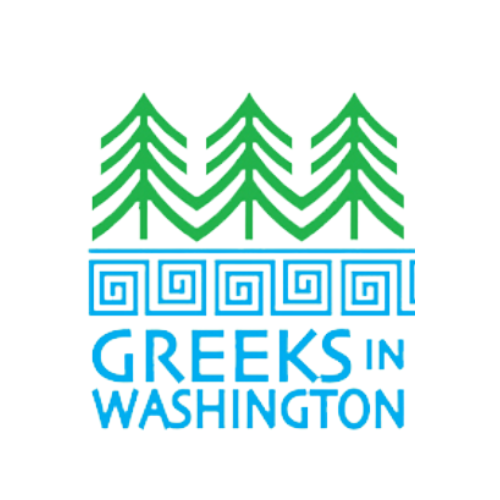Online since 2009.
The GREEK-AMERICAN HISTORICAL MUSEUM OF WASHINGTON STATE was established in 2009 with the mission of establishing an organized means of collecting, preserving and making available the history and culture of the Greek-American community in Washington State.
The Museum, also known as Greeks in Washington, presently operates as a “museum without walls” with online exhibits in the categories of Making a Living, Making a Home, and Keeping Community. The internet provides a means of reaching the entire world and viewer responses have been received from far corners of the globe.
The primary activity of the Museum is to conduct video interviews which become online exhibits with text, photos and video segments. By the end of 2015, there were over 200 video interviews conducted and 150 exhibits posted on the site.
Information about Greeks in Washington is regularly circulated to a wide variety of individuals, organizations and media outlets.
The Museum has established an archive to house donated or loaned items which include textiles, film, video, DVDs, costumes, clothing, bound volumes, printed materials, photos, slides, newspapers, documents, art work, audio recordings and other artifacts. These materials are available for inspection and research purposes.
Projects and Awards
In addition to the online exhibits and the establishment of the archive, the Museum has made a number of presentations including one on Alexander Pantages, the Greek theater mogul.
In 2013 and 2015 the Museum conducted a history competition in which young descendants of Greek immigrants were invited to submit essays, videos, electronic presentations or other media to tell the stories of their families’ immigration and experience in Washington.
The Museum has received the Charles Payton Heritage Advocacy Award from the Association of King County Historical Organizations (AKCHO). This award is for innovation, initiation, development or presentation of a plan by an organization or individual which has led to the advancement of funding for heritage projects, protection of heritage resources, or development of advocacy tools such as posters, videos, newsletters or websites.
The Museum has also been recognized by the Washington Museum Association (WMA) for its “museum without walls” because it serves as a significant model of achievement for Washington Museums. This Award of Project Excellence is for a project such as education, collections management, public programming or a web site.
In 2015, on behalf of the Museum, John and Joann Nicon received the Aspasia Pulakis received the Aspasia Phoutrides Pulakis Memorial Award from the Ethnic Heritage Council of the Northwest (EHC). The award recognizes an individual(s) who have contributed significantly to a northwest ethnic community and to the community at large in the areas of preservation, documentation and presentation of the ethnic experience.
Museum Founders
Joann Nicon’s involvement with the Ethnic Heritage Council of the Northwest including classes in archiving, oral histories, and historical preservation from Seattle’s Museum of History & Industry (MOHAI). John Nicon worked with AAA Washington, preparing several photo/documentaries based on travel experiences around the United States. In 2007 John and Joann authored a photo compilation titled “The Collected Works of Tina Alexander, Stained Glass Artist. That same year, following the publication of the 75th Anniversary book of Seattle’s St. Demetrios Church, the establishment of the Hellenic Studies program at the UW and a substantial donation of AHEPA items from the Rakus family to the UW, Joann and Seattle attorney John T. John discussed the idea of continuing the historical documentation by establishing a museum. Ideas developed, and discussion continued into 2009 when John said, “Let’s just begin even if we have to use our basement for the museum.”
Museum Beginnings
It began with visits to older Greek immigrants before their photos and memorabilia ended in thrift stores. They took a small digital camera along and used the video setting during those visits. Discussions with members of the Greek community with real estate holdings determined that the expense of establishing a physical site was not feasible. Meanwhile, John and Joann had become familiar with three online museum sites: DENSHO, Historylink and Lake Union History Thus, the idea of making the Greek-American Historical Museum of Washington State a virtual or online museum was born. A board of directors was formed from a group of volunteers. A non-profit corporation, a 501 (c) (3) entity, and a website were established. Then when the standing AHEPA (American Hellenic Educational Progressive Association) district governor, an information technology employee at the UW was contacted, he joined the group and continued the development of the site.
Video interviews were scheduled with the help of Greek residents in all parts of Washington State. Collecting items were not in the plan but some items were given and initially stored in the Nicon basement. Formal guidelines were prepared to assist narrators, those persons telling their stories. Several generous donations were received when the idea began. While the museum was never intended to be a member organization nor would fundraising be part of the process, many of those people interviewed voluntarily contributed financially to the program.
In John and Joann’s words, “We are pleased to be using our skills to showcase our ethnic background in a manner that uses the latest technology. Meeting with Greeks in Washington as they share their stories has been incredibly rewarding. Accolades and inquiries from around the world show that there are ways to achieve the goals of collecting, preserving and sharing the Greek heritage without the expenses associated with a physical site.”
Post-pandemic, the museum continues to expand with a new website launching in Spring 2023, many new community connection and outreach projects planned, and a renewed participation in both Washington state and the local Greek-American community.






